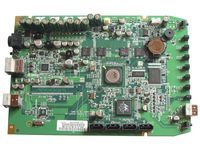Benchmarking With Intel's NAS Toolkit
Hardware And Software RAID
If you look at the construction of a NAS unit, you will see that there are two ways for parity information to be calculated. The main components of a NAS unit are a processor, main memory, flash memory in which the operating system is stored, and a drive controller. The operating system is usually a variation of the freely available Linux operating system; it is used to control and manage the drives.

Part of this management task includes calculating parity information. The control, management, and calculation creates a substantial processing load, which has a negative effect on performance when writing data over the network.
In order to free the CPU from this task, many NAS units have a special, hardware-based RAID controller in place of an ordinary drive controller. This controller takes on all of the management and control tasks of the drive unit and calculates the parity information as well, freeing CPU resources to be used for other tasks. Depending on the RAID level used, hardware-based RAID systems are faster than systems that use software-based RAID management systems.
Why Is Performance So Important?
If a NAS is used on a network, it must be available for a wide range of tasks. In addition to its job as a file server, NAS units can also act as UPnP media servers, iTunes servers, print servers, FTP servers, or Web servers. If the network performance of a NAS unit in any of these areas is not a big deal to you, it may become more of an issue when you start talking about running backups from your local machine to the storage server.
If there are very large volumes of data to back up, this process may take several hours, depending on the speed of the NAS. With slower NAS units, this may mean that the time window available for the backup process is not sufficient. When used for private computers, this is at most, troublesome and annoying. In a business, if staff are unable to work due to a slow backup process, then you are watching money fly out of the window.
Stay on the Cutting Edge
Join the experts who read Tom's Hardware for the inside track on enthusiast PC tech news — and have for over 25 years. We'll send breaking news and in-depth reviews of CPUs, GPUs, AI, maker hardware and more straight to your inbox.
-
malveaux Heya,Reply
Nice. Intel released benchmarking software for NAS... NAS?!?! And they wont let it work on AMD cpu's?
Weaksauce.
Cheers, -
smelly_feet To Toms Hardware:Reply
Please add powerconsumption in all your benchmarks (at the wall). The only reason for me to buy a NAS (over a miniitx) is powerconsumption and heat generated. -
malveaux Hrm,Reply
I too am interested in that Smelly_Feet.
As it is, I use an older computer with some drives in it running FreeNAS. I have no real reason to look into stand-alone-options. If however there are things that use less energy all the time, I'd be tempted to switch things around.
Cheers,
Most Popular


